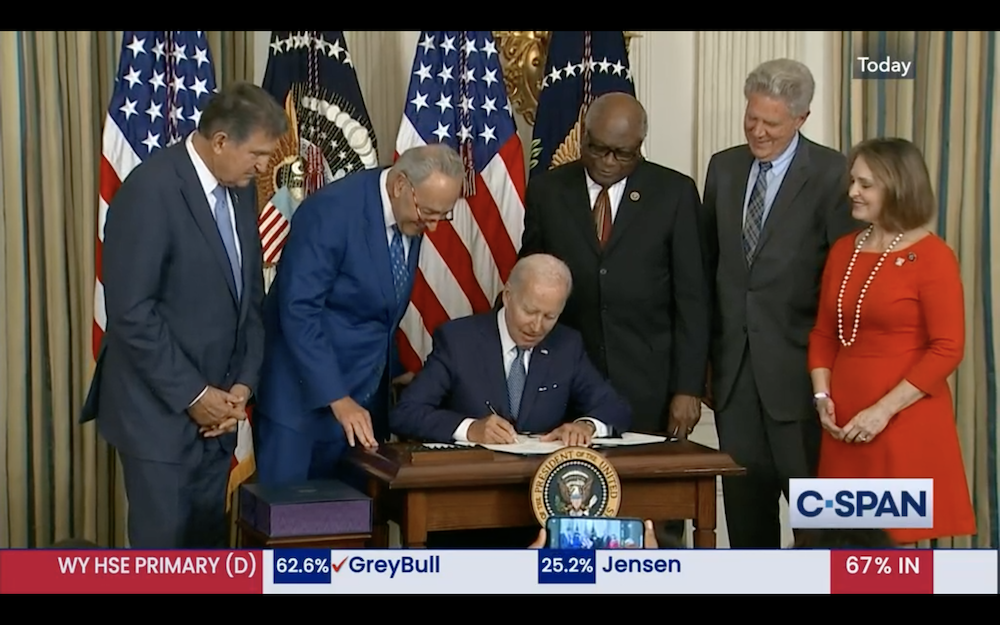
- Details
- By Jenna Kunze
President Joseph R. Biden on Tuesday signed the Inflation Reduction Act (IRA) of 2022 into law, which includes more than $720 million for Tribal communities to support climate resilience and adaptation initiatives, lowering energy costs and transitioning to clean energy, and affordable and expanded health care.
 Daron Carreiro, Senior Policy Advisor for Native Affairs at the White House Domestic Policy Council (Photo: LinkedIn)Daron Carreiro, a citizen of the Chickasaw Nation and the Senior Policy Advisor for Native Affairs at the White House Domestic Policy Council, spoke with Native News Online about the landmark legislation. Carreiro said the legislation was a “huge win” for the country, and called the Act the most aggressive action to confront the climate crisis to date.
Daron Carreiro, Senior Policy Advisor for Native Affairs at the White House Domestic Policy Council (Photo: LinkedIn)Daron Carreiro, a citizen of the Chickasaw Nation and the Senior Policy Advisor for Native Affairs at the White House Domestic Policy Council, spoke with Native News Online about the landmark legislation. Carreiro said the legislation was a “huge win” for the country, and called the Act the most aggressive action to confront the climate crisis to date.
“We are particularly excited about the Tribal-specific provisions of the act,” Carreiro said.
Senate Democrats say the bill “will make a historic down payment on deficit reduction to fight inflation, invest in domestic energy production and manufacturing, and reduce carbon emissions by roughly 40 percent by 2030.”
Additionally, the bill will allow Medicare to negotiate for prescription drug prices and extend the expanded Affordable Care Act program for three years.
Included in the tribal-specific funding are provisions to:
- Support Tribal climate resilience and adaptation. The Inflation Reduction Act includes Tribal-specific funding to address climate-related impacts in Indian country, including: $220 million for Tribal climate resilience and adaptation programs at the Bureau of Indian Affairs (BIA); $12.5 million to mitigate drought impacts in Tribal communities; and $10 million for Tribal fish hatchery operations and maintenance programs.
- Fund a Tribal electrification program. The Inflation Reduction Act includes $150 million for a Tribal Electrification Program for Tribes and Tribal organizations to provide electricity to unelectrified Tribal homes through zero-emission energy systems, and to transition electrified homes to zero-emission energy systems.
- Support Tribal energy development. The Inflation Reduction Act provides an additional $75 million for the Tribal Energy Loan Guarantee Program, and increases loan guarantees for Tribal energy development from $2 billion to $20 billion.
“We know tribal nations are on the frontlines of climate change,” Carreiro told Native News Online. “But we also know they hold an enormous amount of renewable energy potential, and economic development potential.”
Though several leaders across Indian Country regard the Inflation Reduction Act as a critical step towards progress, some say it doesn’t go far enough to protect the planet.
Yurok Tribe Councilmember Phillip Williams said the Tribe’s ancient redwood trees have been decimated by wildfires.
“From our perspective, our world has been thrown out of balance,” Williams said in a statement. “While this IRA bill will help, it falls short in hitting the mark of what is needed. The President must declare a National Climate Emergency to help restore balance to the world.”
The bill also faces criticism for its investment in fossil fuels, including subsidizing the construction of new pipelines and promising the renewal of oil and gas leases. A group of more than 80 climate justice advocates spoke out against the bill, concluding that its commitment to the fossil fuel industry outweighs its benefits to clean energy and climate resiliency.
"We are sitting right now with a lot of contradictions. While [the bill] does designate some funding for disadvantaged communities, it's also subsidizing fossil fuels," Juan Jhong-Chung, the climate director at the Michigan Environmental Justice Coalition, told NPR. "It feels like what the bill is giving with one hand, it's taking with the other."
In response to that criticism, Carreiro said the bill “makes really strong commitments to climate change and renewable energy and does so for tribes and tribal programs."
“I think all energy development should be done with an eye toward self-governance and self-determination of tribes in stewardship of tribal lands,” he said. “President Biden has promoted clean energy development in Indian Country, [while] recognizing that tribes also — as a matter of tribal sovereignty and self determination — have a wide range of economic development priorities and opportunities and support tribal decisions in those areas, as well.”
More Stories Like This
Native News Weekly (August 25, 2024): D.C. BriefsNative News Weekly (February 22, 2026): D.C. Briefs
NCAI Releases Sttatement on the Passing of Rev. Jesse Jackson
Colusa Indian Energy Participates in Port of Quincy Town Hall on Columbia Basin Power Project
Q&A: Jingle Dress Dancer Answered Call to Ceremony in Face of ICE Violence
Help us defend tribal sovereignty.
At Native News Online, our mission is rooted in telling the stories that strengthen sovereignty and uplift Indigenous voices — not just at year’s end, but every single day.
Because of your generosity last year, we were able to keep our reporters on the ground in tribal communities, at national gatherings and in the halls of Congress — covering the issues that matter most to Indian Country: sovereignty, culture, education, health and economic opportunity.
That support sustained us through a tough year in 2025. Now, as we look to the year ahead, we need your help right now to ensure warrior journalism remains strong — reporting that defends tribal sovereignty, amplifies Native truth, and holds power accountable.
 The stakes couldn't be higher. Your support keeps Native voices heard, Native stories told and Native sovereignty defended.
The stakes couldn't be higher. Your support keeps Native voices heard, Native stories told and Native sovereignty defended.
Stand with Warrior Journalism today.
Levi Rickert (Potawatomi), Editor & Publisher


